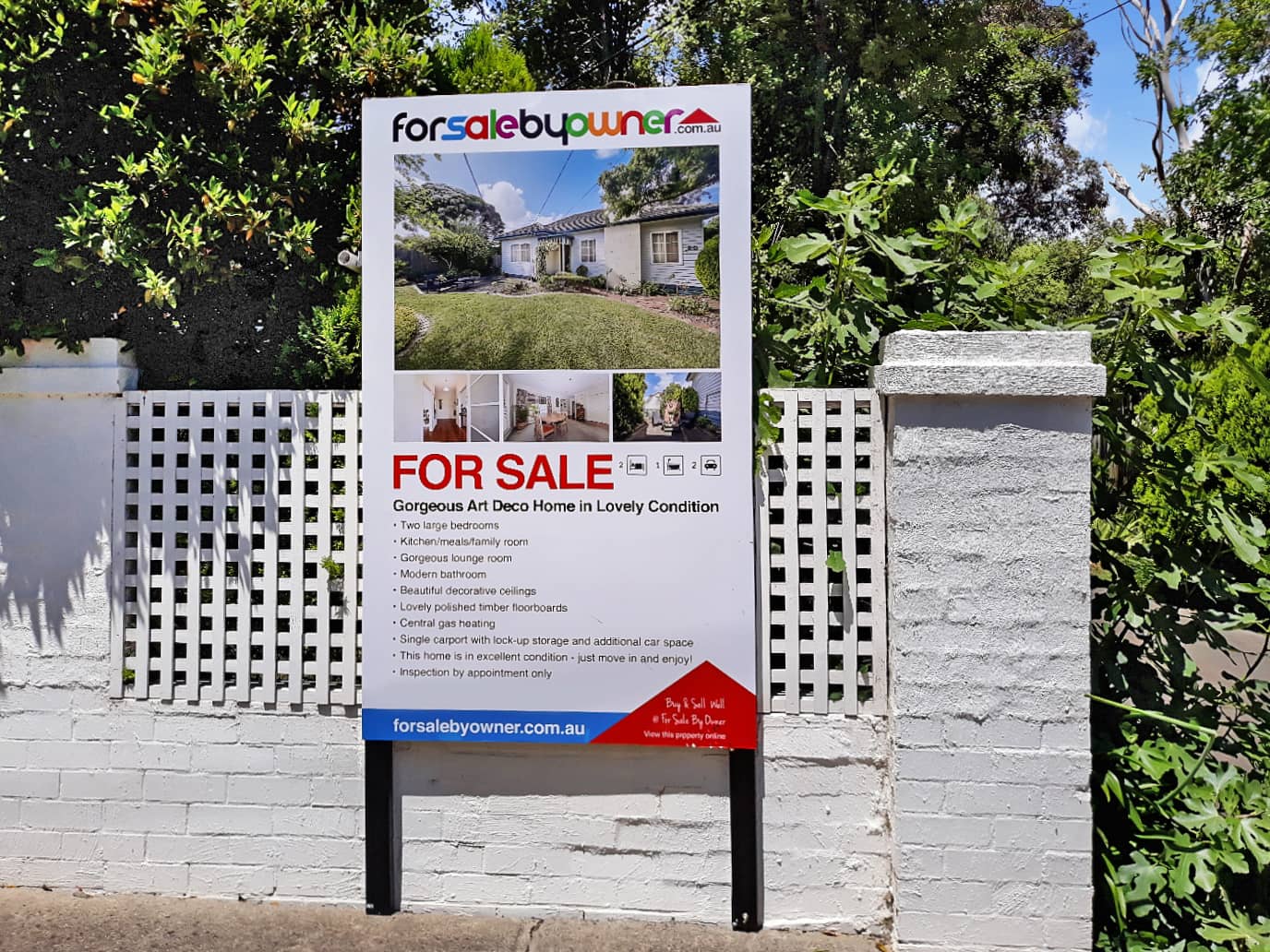Selling Your House Privately Legal Requirements
State & Territory real estate information

Legal Requirements | For Sale By Owner
Australia has no legal requirement to use a real estate agent to sell or rent out your house privately. This also applies to other residential properties such as apartments, townhouses, retirement units, acreage, rural properties, and blocks of land. Many people engage agents because they assume that this is a legal requirement, but this is not the case.
When selling your house with a real estate agent, you would still need to engage your own solicitor, conveyancer, or settlement agent to do the legal paperwork. They would then also facilitate the transfer or title and discharge of the mortgage (if applicable). With a private sale using our services instead of a traditional agent, this is no different. They will also be able to oversee and assist with the preparation and signing of the contract, as well as being able to provide a trust fund for the deposit (if applicable).
Since 1999, For Sale By Owner has assisted homeowners in selling their properties without the use of traditional real estate agents. It’s legal, relatively easy, and something that you can also do. By selling yourself privately, you can save many thousands of dollars in commission fees. Please get in touch with us to see how you too can sell without using an agent.
Please note that the information provided here does not constitute legal advice. You must seek your own legal advice with any issue relating to your own individual circumstances.
1. Real Estate Laws Are Governed By State Governments
Real estate laws in Australia are unique to each State and Territory of Australia. Many of the legal requirements relating to selling a house are specific to the relationship between agent and vendor, so when selling privately, these do not affect you in any way. Other legal requirements will apply to you, such are contract preparation, vendor statements, and underquoting guidelines.
Whilst the information provided here may answer some of your questions, it should not be considered definitive, and we would encourage you to contact us directly if you’d like more information or help with a specific issue.
2. Real Estate Documents
The legal requirements when it comes to the sale of your home vary depending on where in Australia your property is located. For example, if selling a house in NSW or ACT, it’s a legal requirement that you have a contract drawn up first prior to engaging in any advertising.
In other states like VIC, you can start to advertise before having a contract drawn up, but you will need to give a copy of a Section 32 to the buyer before a contract is entered into. Below you’ll find some more specific information, but please feel free to contact us to discuss the specifics of your property.
3. Real Estate Underquoting Laws
Underquoting is the practice of listing a property for sale at a price that is less than the estimated selling price, less than the seller’s asking price, or at a price that has already been rejected by the vendor. Some states have specific laws that govern how a property’s price can be displayed.
In Victoria, for example, words like “Offers Above” or “From” cannot be used in the pricing field. In the various State and Territory sections below you’ll find more state-specific information about these legal requirements. Please be aware that Australia’s various real estate institutes are related to agent-specific issues. The actual
Legal Requirements When Selling Your House (Part 1)
Legal Requirements When Selling Your House (Part 2)
1. Legal Requirements When Selling Your House in VIC

Section 32: In Victoria, you can start advertising a property before a contract is prepared. However, before a contract can be given to a buyer, they must be given a copy of a Vendor’s Statement, also known as a Section 32. This is a mandatory document that discloses information that may relate to the value of the land being sold in a property transaction.
Due Diligence Checklist: Online Advertising of a property in Victoria must be accompanied by a Due Diligence Checklist. This checklist aims to help buyers identify whether there are any issues that may impose restrictions or obligations on the buyer. You do not need to provide or upload this yourself. If your property is based in Victoria, the Due Diligence Checklist will automatically be shown on our website and most of the other websites to which we publish.
Statement of Information: In Victoria, a property being advertised for sale must be accompanied by a Statement of Information. This document states an indicative price at which the property will sell, as well as comparable sales information. The price listed on the Statement of Information must be a single price or a price range of up to 10 per cent. The price must not be less than the estimated selling price or at a price that has previously already been rejected.
Cooling-Off Period: A Cooling off period of three working days is applicable to residential sales and small rural property sales. This allows the buyer to pull out of the sale. In this case, the buyer will no longer be contractually bound to bound the property in question but will have to pay $100 or 0.2% of the purchase price, whichever is greater. The cooling-off period does not apply in some cases, including properties sold at auction.
Underquoting: It is illegal to misrepresent a property in any way when advertising or marketing that property, whether verbally or in writing. It should be remembered though that the price of a property can legitimately fluctuate in response to the market. Property should not be priced lower than the current estimated price or at a price that has previously been rejected. If selling at auction, your property should also not be priced less than your reserve price.
See also: For Sale By Owner VIC
2. Legal Requirements When Selling Your House in NSW

Contracts: If you are looking to sell a property in New South Wales, you will need to have a contract prepared prior to advertising. This can be prepared by a solicitor or conveyancing business. The contract of sale will need to include the terms and conditions of your sale, title documents and the s149 zoning certificate, compliance certificates for items like pools, relevant documents for strata title and drainage diagrams.
Underquoting: NSW has specific rules that regulate how the price of a property can be displayed. The rules came into effect in 2016 and were introduced so as to give buyers a more transparent and accurate indication of the price of a property. The legal requirements relating to pricing also ban the use of phrases, terms or symbols like ‘offers above’, ‘offers over’ or ‘+’ with a price or price range. For example, you cannot advertise a property as being ‘$700,000 plus’, ‘offers over $700,000’ or ‘$700,000 +’. However, using phrases or terms like ‘price guide’, ‘guide’, ‘auction guide’, ‘bidding guide’, ‘estimate’ or ‘price estimate’ are permitted if the published or stated price figure or price range complies with the Act’s other requirements.
Cooling-Off Period: The buyer of a property in NSW generally has five working days after contract signing, in which they can still withdraw from the sale. The cooling-off period does not apply to the seller; it only protects the buyer. It also does not apply to auctions. The cooling-off period can also be waived, made shorter, or extended, in all parties agree to this.
See also: For Sale By Owner NSW
3. Legal Requirements When Selling Your House in QLD

Contracts: In Queensland, the contract of sale for real estate sets out the agreed price, details of when the buyer will pay the deposit, and the time and date of settlement. Only when you and the buyer have both signed the contract does it become legally binding. The buyer will typically then need to pay the deposit within 2-3 days. The contract may of course include conditions such as the sale being subject to finance by a specific date, building inspections, or any other range of conditions.
Warning statement: Contracts in Queensland must also include a warning statement. Your solicitor or conveyancer can assist with this to ensure that the contract complies with all state law requirements.
Cooling-Off Period: A cooling-off period of 5 days applies to contracts for residential property, excluding properties bought at auction. The buyer can also waive this cooling-off period if they so choose.
See also: For Sale By Owner QLD
4. Legal Requirements When Selling Your House in WA

Advertising and Marketing: In Western Australia, it is illegal to represent a property for sale in a misleading or deceptive manner. This relates to any form of marketing or advertising, including text, photos or anything verbally communicated. It’s important that you provide information to potential buyers which are both factually correct as well as current. If the marketing is inaccurate, the buyer may have the option to take legal action on the grounds that they have been misrepresented.
Cooling-Off Period: There is no mandatory cooling-off period for real estate transactions in Western Australia. If you wish to have a cooling-off period and the buyer agrees to this, then it must be clearly stated in the contract of sale.
Pricing: Whilst private sellers may not need to comply with all the laws applicable to real estate agents, it’s important to be aware of pricing regulations to which agents must comply. In terms of real estate pricing, it’s illegal for an agent to list a property for sale at a price less than the asking price or reserve price. Underquoting in this way unfairly wastes potential buyers’ time.
See also: For Sale By Owner WA
5. Legal Requirements When Selling Your House in SA

Form 1: When selling your house privately in South Australia, you need to provide the buyer with a Form 1 document, also known as a Vendor’s Statement. Your solicitor will be able to prepare this document for you. It’s extremely important that this document be correct and accurate as there are remedies available to a purchaser when they have already settled on the property but were not provided with a valid and correct Form 1 document.
Cooling-Off Period: In South Australia, the cooling-off period is two business days. It’s important to note, however, that the start date of the cooling-off period is based on the date the buyer receives a copy of the Form 1. If they received this prior to the contract being signed, then this date begins once the contract is signed by both parties. If they have not yet received it, the cooling-off period only begins when they receive a copy of the Form 1.
See also: For Sale By Owner SA
6. Legal Requirements When Selling Your House in TAS

Contracts: In Tasmania, the most commonly used contract is that which is published by the Tasmanian Law Society and the Real Estate Institute of Tasmania. Your solicitor will be able to prepare and oversee the signing of the contract.
Cooling-Off Period: In Tasmania, there is no cooling off period, similar to properties being sold at auction. There is also no requirement to disclose defects in the quality of the property for sale.
See also: For Sale By Owner TAS
7. Legal Requirements When Selling Your House in the NT

Contracts: In the Northern Territory, a contract of sale for real estate must be approved by the Registrar or Law Society of the NT.
Cooling-Off Period: The cooling-off period in the Northern Territory is 4 business days, during which the buyer can terminate the contract without penalty. If you and the buyer agree, the cooling-off period can be waived, changed or extended.
See also: For Sale By Owner NT
8. Legal Requirements When Selling Your House in the ACT

Contracts: It is a legal requirement that a contract of sale be prepared before property in the Australian Capital Territory can be advertised for sale. There can be quite heavy penalties for not having this contract available whilst advertising. The contract must meet certain conditions and be made available to buyers before they make any offer to purchase. It’s important to note that accompanying documents that are part of the contract can vary depending on the type of property that is being sold.
Cooling-Off Period: The cooling-off period in the Australian Capital Territory is 5 business days. Should a buyer decide to terminate the contract, they will need to provide you with written notice of this. They are also liable to pay a penalty fee of 0.25% of the purchase price.
See also: For Sale By Owner ACT
Many people in Australia use a real estate agent when selling their home as they assume that this is a legal requirement. This is not the case and it’s perfectly legal for you to sell your home yourself without engaging an agent. When selling a property through an agent, you would normally still engage a solicitor or conveyancer or settlement agent to take care of the paperwork relating to settlement. When selling yourself without using an agent, we recommend still engaging a professional and not doing this part of it yourself.

